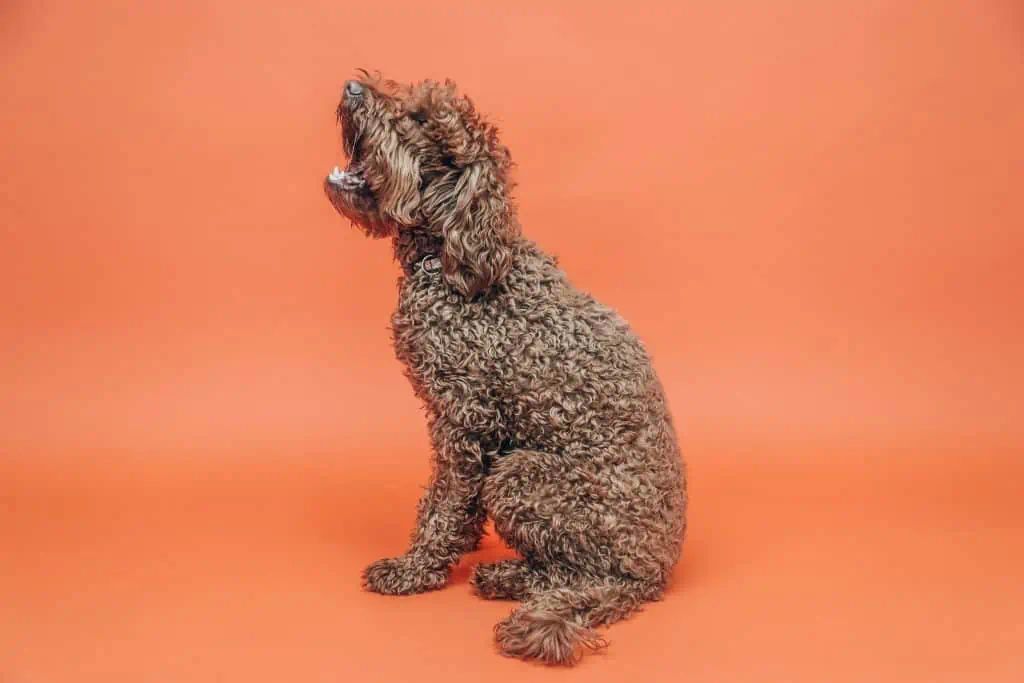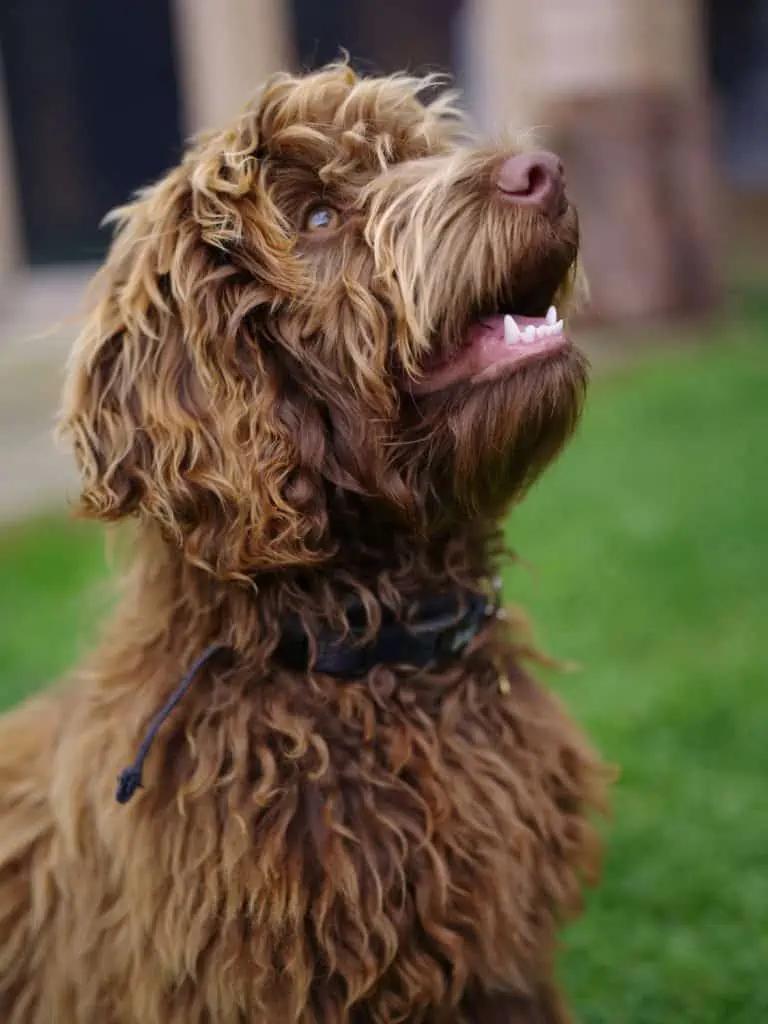A fiery redhead if there ever was one, the Irish Doodle stands apart from a number of other designer dog breeds of similar stature. With his glowing mahogany coat, intelligent demeanor, and family-friendly temperament, it’s a wonder the Irish Doodle hasn’t become even more popular than he already is!
Alas, this is a hybrid dog that is still developing, and though he may not be one of the most well-known doodle dogs in the canine kingdom, he certainly has the potential to be a fast-rising star.
And if you’re here, you must have your eye on this darling dog. Join us today as we talk all about the Irish Doodle and perhaps help you can decide if this hybrid would be the perfect addition to your home or family!
Contents
Introducing The Irish Doodle
The Irish Doodle is a cross between the Irish Setter and the purebred Poodle.
Type: Crossbreed, Mixed Breed, Designer Dog, Hybrid dog
Parent Breeds: The Irish Setter and The Poodle
Other Names: The Irish Setterpoo, The Doodle Setter, The Irish Doodle Setter, and The Setterdoodle
Height: 24 to 26 Inches
Weight: 50 to 75 Pounds
Hypoallergenic: Potentially
Temperament: Friendly, Intelligent, Sweet-Natured, Playful, Eager To Please, Family-Oriented
Best Suited For: Active Families, Those With Allergies, First Time Dog Owners
Lifespan: 12 to 15 Years
Health issues: Progressive Retinal Atrophy, Autoimmune Thyroiditis, Gastric Torsion, Osteosarcoma, Epilepsy, Cancer, Addison’s Disease, Hypoglycemia, Collapsed Trachea, And Thyroid Issues
Irish Doodle Overview:
The Irish Doodle is a relatively new designer dog, which means he was purposefully bred to inherit the traits of both the purebred Irish Setter and the purebred Poodle.
As such, Irish Doodle dogs are highly intelligent, family-oriented, playful, and energetic. They are ideally suited for active families, singles, and couples who have the time not only to commit to their dog’s exercise and mental stimulation but also to their emotional well-being.
Family-oriented, Irish Doodles can be prone to suffering from separation anxiety, especially if they are not kept mentally stimulated when owners are away.
They may also have some strong hunting instincts, which will require routine training and for owners to walk their Irish Doodle on a leash to reduce potential dangers for their dog.
Otherwise, the Irish Setter makes a lovable and social companion for first-time dog owners who are able and willing to be active and playful with other dogs.
This is not an ideal apartment dog, however, as Irish Doodles are known for their energetic nature and zest for life.
Are you wondering if the Irish Doodle is the right dog for your home or family? Before you decide, let’s learn more about the specifics of this unique crossbreed and talk about the crossbreed controversy.
The Irish Doodle And The Crossbreed Controversy
Irish Doodles are intelligent and active dogs that do well with children.
Crossbreed dogs are dogs like the Irish Doodle who have two different purebred parent breeds. Also known as hybrids, mixed dogs, or designer dogs, crossbreed dogs come in varying generations, with newer generations being less predictable than later generations.
Despite the fact that crossbreeding is an age-old practice, modern-day hybrid dogs like the Irish Doodle are still surrounded by controversy.
Part of the issue has to do with terminology. There are those that consider crossbreed dogs to be nothing more than glorified mutts. In fact, crossbreed dogs like the Irish Doodle are not recognized by most major breed clubs, including the American Kennel Club.
This means that the Irish Doodle and other crossbreed dogs like him are not eligible for show. With that said, the Irish Doodle is a costly dog, often being bred and sold by breeders who charge thousands of dollars.
The cost for a dog that may be unpredictable in traits like temperament, appearance, and health has certainly stirred up some debate, and it’s easy to see why.
However, most purebred dogs we are familiar with today are the result of careful crossbreeding over generations. Still, it takes years of crossbreeding and perfecting before a crossbreed can graduate to be considered a purebred.
Once a dog is considered a purebred, there is a specific pedigree this dog’s genetics abide by, and these dogs generally have a specific coat type, overall appearance, height, and weight, and they are pretty predictable when it comes to health and temperament.
Still, there are some cons to purebred dogs.
Some experts speculate that purebred dogs have been so carefully overbred that they are often more susceptible to suffering from specific genetic illnesses. Crossbreed dogs, on the other hand, may have the advantage of hybrid vigor.
Hybrid vigor is the theory that crossbreed dogs could potentially be healthier than their purebred counterparts thanks to the fact that they have a wider gene pool.
While this does sound promising, there are those that point out that genetics are genetics and there is very little you can predict when it comes to a crossbreed dog and what that dog might inherit from his parent breeds.
The truth is, both crossbreed dogs and purebred dogs can be susceptible to the same genetic health issues as their parents, and this is one of the reasons responsible breeding practices are so important.
But we will talk about all of this in more detail further down. For now, let’s take a closer look at the Irish Doodle.
The Origin Of The Irish Doodle
The Irish Doodle is considered a very new crossbreed and is the offspring of the purebred Irish Setter and the purebred Poodle, as we mentioned above.
While Poodles can range in size, most Irish Doodle dogs are large breed dogs and can stand over two feet at their shoulder.
The Irish Setter is a shedding dog in his purebred form, while the Poodle has a tightly curled hypoallergenic coat. Both the Irish Setter and the Poodle are hunting breeds, so it can be easy to speculate that their Irish Doodle offspring might have some hunting instincts.
So, what does this mean for the Irish Doodle’s temperament? Let’s find out!
Is The Irish Doodle A Good Family Dog? Let’s Look At Temperament!
Irish Doodles make wonderful family pets when raised by the right family or owner.
Although both the Irish Setter and the Poodle are hunting dogs with working origins, they are also known to be incredibly patient, friendly, intelligent, and social. Both the purebred Irish Setter and the purebred Poodle are family-friendly dogs, and this means that their Irish Doodle offspring is likely to be a family favorite as well.
Most experts agree that the Irish Doodle is relaxed around more mild-mannered people, but that he adapts well to more playful folks or rambunctious children. His sturdy stature makes him perfect when it comes to youngsters, and his patient and gentle nature is excellent for those who may be wary around larger dogs.
Irish Doodles are social dogs who do well in households not only with children but also with other pets. They will especially enjoy other canine playmates, though they should be watched around other pets like rodents, birds, or reptiles.
Keep in mind that both the purebred Poodle and the purebred Irish Setter were bred hunting dogs, so it’s important not to leave your Irish Doodle unsupervised around other types of animals in the home.
When it comes to raising your Irish Doodle with children, this is a famously family-oriented hybrid.
If you do plan on raising your Irish Doodle around children, it’s of course important to work with children on how to respectfully interact with the family dog. We recommend working with children and other family members to understand basic canine body language.
Doing so can help you to better understand when your dog is stressed, happy, fearful, or anxious.
Of course, this will go hand-in-hand with training and socializing your Irish Doodle. Keep reading to learn more.
The Importance Of Training And Early Socialization Of A Irish Doodle
Training and socialization should begin at an early age for your Irish Doodle.
All dogs need routine training and socialization beginning at an early age in order to thrive, and the Irish Doodle is certainly no exception.
Luckily, the Irish Doodle is an intelligent dog that is known to be eager to please and easy to train. However, he is an energetic dog who can become bored easily, especially if training is not kept gamelike or if he is not kept mentally stimulated.
How To Train An Irish Doodle
While dogs tend to do best when training begins during puppyhood, it is never too early or too late to begin training an Irish Doodle. We recommend training your dog from the moment you bring him home.
Irish Doodles are sensitive dogs that do best with patience and positive reinforcement training. It’s best to avoid aversive training methods that utilize punishments, fear, or scolding. Training your dog using aversive training techniques could actually harm the relationship built between you and your dog. Furthermore, aversive training methods may even hinder your Irish Doodle dog’s ability to learn or withhold information.
Instead, stick with using high-value training treats, lots of praise, patience, and consistency. Keep training short and gamelike, with five-minute increments of training and plenty of breaks between to play or rest.
When you are working to hold your Irish Doodle dog’s attention, it’s best to use treats that are small, very palatable, and smelly. These training treats are considered high-value training treats, and they will help to keep your dog’s attention on you during training sessions.
Pupford Freeze Dried Training Treats
[amazon box=”B0817PTT86″ style=”light” title=”Pupford Freeze Dried Training Treats” template=”widget” ]
Some wonderful freeze-dried training treats you might consider are the freeze-dried training treats above by Pupford. These training treats are made with real meat animal protein like chicken, rabbit, live, or salmon.
The treats are made with quality ingredients and are low-calorie, making them healthy and ideal for fast feeding or rapid feeding during certain training sessions. We also like that these training treats contain simple ingredients that are ideal for those who may struggle with allergies.
If you do have an Irish Doodle with a sensitive stomach or allergies, we recommend choosing training treats that are made with salmon or rabbit and avoiding treats that are made with chicken.
We also like that you can use these freeze-dried training treats not only for training sessions with your Irish Doodle but also for helping when it comes to socialization.
How To Properly Socialize An Irish Doodle
Socializing any dog is incredibly important to that dog’s overall wellbeing. When it comes to socialization, we recommend introducing your dog to as many new experiences as possible at an early age. This should include new sights, sounds, strangers, children, other animals, and new environments.
It’s very important for your Irish Doodle to have positive first impressions of new experiences, so avoid forcing your dog into a situation you can tell is obviously stressful for him.
This is where your high-value training treats can come in! When you are socializing with your dog, be sure to offer him plenty of positive reinforcement and tasty treats. Doing so will help him associate the experience he is having with something positive.
While it is important to train and socialize any dog, it’s also important to remember that all dogs can become frightened, impatient, or defensive. As we mentioned above, it’s best to work with age-appropriate children on how to properly interact with the family dog.
It’s also best to never leave small children alone with your Irish Doodle without supervision to ensure everyone is getting along happily.
How To Keep Your Irish Doodle Properly Exercised And Mentally Stimulated
Irish Doodles are intelligent and athletic dogs. They need both their mind and body exercised.
We have mentioned now a few times that the Irish Doodle is an energetic and social pup, so it should come as no surprise to hear that this is a dog that is going to require a good amount of exercise.
Exercising your Irish Doodle goes beyond just ensuring his body is kept in shape. Highly intelligent, the Irish Doodle is also going to need routine mental stimulation to help reduce undesirable behaviors.
The Importance Of Exercising An Irish Doodle
The Irish Doodle is an athletic dog, and though he is large, he can have his exercise needs met in a variety of ways.
On average, the Irish Doodle is going to need at least an hour or more of dedicated exercise each and every day to stay happy and healthy. This exercise could be in the form of daily walks, jogs, hikes, runs, or even routine swims.
The Irish Doodle may also enjoy free playtime at a dog park or in a large, securely fenced yard.
When you are walking your Irish Doodle outside of your home, be sure he is wearing a proper leash and harness.
While the Irish Doodle is intelligent, keep in mind that he could have strong hunting instincts. This means he could be prone to chasing after smaller animals, and this could put him in danger, especially if you are walking by a busy road.
We should also note here that because the Irish Doodle is an athletic and energetic dog, he could be prone to pulling.
It’s best to avoid aversive walking equipment like prong collars or choke chains, as these products could actually harm your dog.
Instead, we suggest investing in a front clip harness that is designed to make walking feel more natural for your Irish Doodle and to help reverse undesirable walking behaviors.
2 Hounds No Pull Freedom Harness
[amazon box=”B07BGJ1BTR” style=”light” title=”2 Hounds No Pull Freedom Harness” template=”widget” ]
The 2 Hounds No Pull Freedom Harness is a popular harness amongst positive reinforcement trainers who utilize this harness to not only reduce pulling but also redirect dogs who do get ahead of themselves.
The harness is designed to fit more naturally on your dog, reducing the tension he may feel pulling against his chest, which could encourage him to pull against the pressure.
Instead, this harness clips both in the front and in the back, offering more relaxed walking for your dog and better control for you. If your dog does pull ahead on walks, the front clip harness will redirect him back to your side without putting pressure on his throat or trachea.
How To Keep Your Dog Mentally Stimulated
As we mentioned earlier in this article, exercise for an Irish Doodle should be focused on both the mind and the body.
Remember, the Irish Doodle comes from two working parents, which means he too is a working dog at heart. Incredibly intelligent, the Irish Doodle could be easily prone to anxiety if not kept mentally stimulated.
This is especially true if he is left to his own devices for too long or if he is left to become bored or stressed.
Ensuring your dog is properly mentally stimulated can help reduce anxiety, stress, and boredom that could potentially lead to behavioral problems including barking, barking, chewing, and scratching.
Proper mental stimulation could include routine training sessions you do with your dog, but it also could include investing in toys and tools that challenge your brainy pup and keep him thinking.
If you prefer, you can set up your own obstacle course by hiding treats around your home or yard and encouraging your dog to sniff them out.
Nina Ottosson By Outward Hound
[amazon box=”B0711Y9XTF” style=”light” title=”Nina Ottosson By Outward Hound” template=”widget” ]
One puzzle toy we recommend for brainy dogs like the Irish Doodle is a toy like the Outward Hound Puzzle Toy above. This toy comes in different levels so you can customize it based on your dog’s level of intelligence and ability to solve problems.
We like that this toy works using treats, so it helps to keep your dog motivated and feeling rewarded when he solves the problems to get to the snacks.
Along with using puzzle toys, we also suggest you invest in toys like snuffle mats, puzzle toys, and KONGS that help keep your dog actively engaged and busy for longer periods of time.
Remember, ensuring your dog is properly exercised both mentally and physically not only helps reduce behavioral issues but can also help lead to a healthier, happier dog.
And speaking of health, let’s take a moment now to look at the Irish Doodle’s health and lifespan.
What Is The Irish Doodle Dog’s Lifespan And Does He Have Any Health Issues?
Like all dogs, Irish Doodles can be predisposed to genetic health issues.
Though he is a larger breed dog, the Irish Doodle has a decent lifespan of between 12 and 15 years. Luckily, both the Irish Setter and the Poodle are considered hardy dogs, and the fact that the Irish Doodle is also a crossbreed could give him the added benefit of hybrid vigor.
However, remember that while hybrid vigor does sound promising, your Irish Doodle could still be susceptible to any of the same health issues as both of his parent breeds.
These health issues include but may not be limited to:
- Progressive Retinal Atrophy
- Autoimmune Thyroiditis
- Gastric Torsion
- Osteosarcoma
- Epilepsy
- Cancer
- Addison’s Disease
- Hypoglycemia
- Collapsed Trachea
- And Thyroid Issues
Because the Irish Doodle can be susceptible to several health issues related to diet, it’s important that you ensure your dog is on a quality dog food specified for his age, weight, and activity level.
The Irish Doodle is a large breed dog, and as such he will do best on a dog food for large breed dogs that is made with real animal protein. This dog food should also be free of by-products, corn, soy, wheat, or gluten.
Instead, choose a dog food that contains real animal protein like beef, salmon, chicken, or lamb, and a dog food that contains fatty acids, healthy carbs, vitamins, minerals, and is a good source of water.
Of course, you do have the option of choosing between dry dog food, wet dog food, raw dog food, or freeze-dried dog food. All of these types of dog foods have their pros and cons, and it’s important to do your research when deciding which type of dog food would be best for your unique Irish Doodle.
Along with investing in quality dog food, we also recommend considering a slow feeder for your Irish Doodle.
This is because the Irish Doodle can be especially prone to Gastric Torsion, also known as Bloat or GDV. Gastric Torsion is a serious medical emergency that occurs when a dog’s intestines fill up with air, causing it to flip.
You can help reduce chances of Bloat in your Irish Doodle by ensuring he does not eat immediately after exercise or play, and that he uses a slow feeder during mealtime to reduce the amount of air swallowed when he is eating.
Outward Hound Slow Feeder Bowl
[amazon box=”B00FPKNRCS” style=”light” title=”Outward Hound Slow Feeder” template=”widget” ]
One slow feeder we recommend for the Irish Doodle is a slow feeder made by Outward Hound. This feeder comes in several different pattern types and sizes, so you can customize it to your dog’s needs.
It also comes in different colors, which is always a bonus!
The product is made with quality material and includes a slip-free bottom. Not only can it help to reduce bloat by slowing down your dog’s eating, but it can also help improve digestion and reduce potential obesity.
Other ways to help keep your Irish Doodle healthy include keeping up with routine vet visits. Remember that all dogs should be seen at least once a year by their Veterinarian for general checkups.
We also suggest considering having your dog’s health screened at an early age, and of course making sure you get your puppy or rescue dog from a reputable breeder or shelter.
Grooming An Irish Doodle – What You Should Know
The Irish Doodle can have long, curly hair that can be prone to matting.
Grooming your Irish Doodle properly is another way you can help to reduce potential health issues and keep your dog happy and feeling his best.
While the Irish Doodle does have the potential to be hypoallergenic, keep in mind that his coat type could vary depending on his generation and his parent breeds. If you are looking for an Irish Doodle that does have a hypoallergenic coat, we recommend looking for breeders who can provide you with later generations Irish Doodles.
Otherwise, his coat could be more like his Poodle parent or more like his Irish Setter parent, and it will be difficult to predict during puppyhood.
Regardless, the Irish Doodle is going to need to be brushed at least once a week, but possibly more if his fur is allowed to grow out long.
The Irish Doodle could be prone to tangles and mats, and a quality dematting comb will be an essential tool for his grooming kit.
Because the Irish Doodle is a hybrid and is not eligible for show, many owners opt to keep his coat trimmed in a puppy cut. This cut can help reduce tangles and mats and reduce the maintenance of his overall grooming routine.
Along with brushing, the Irish Doodle will need a routine bath once every four to six weeks. When bathing your Irish Doodle, be sure to use a dog-safe shampoo that is free of any ingredients that could strip his coat and skin of the natural oils that help keep his fur healthy.
Like all dogs, the Irish Doodle should have his ears kept clean and free of waxy debris and buildup, his teeth should be brushed routinely with a dog-safe toothbrushing kit, and his nails should be trimmed every few weeks.
Are You The Right Owner For An Irish Doodle?
Irish Doodles are excellent dogs for active dog owners and families with children.
On paper, (and probably in person), the Irish Doodle seems like the perfect pup. Of course, like all dogs, the Irish Doodle comes with its share of pros and cons, and he is certainly not the ideal dog for every owner or household.
Keep in mind that Irish Doodles are high-energy crossbreed dogs that require at least an hour or more of dedicated exercise each and every day.
They do best in homes with backyards and are not the ideal apartment dog. Irish Doodles may also have some hunting instincts, so it will be important to train and socialize them early and to ensure you are walking them on the proper walking equipment to help keep them safe.
If you have youngsters or other dogs in the home, the Irish Doodle could be the addition you’ve been waiting for. This dog is a great companion for children and is a dog-social pup as well.
So, is the Irish Doodle the right dog for you? Tell us what you think in the comment section below! Thanks for reading!


Jen Jones is a professional dog trainer and behavior specialist with more than 25 years of experience. As the founder of ‘Your Dog Advisor’ and the ‘Canine Connection’ rehabilitation center, she applies a holistic, empathetic approach, aiming to address root causes rather than merely treating symptoms.
Well known for her intuitive and compassionate approach, Jen adopts scientifically-proven, reward-based methods, encouraging positive reinforcement over punishment. Jen specializes in obedience training, behavior modification, and puppy socialization. Her innovative methods, particularly in addressing anxiety and aggression issues, have been widely recognized. Jen has worked with many of the world’s leading dog behaviorists and in her free time volunteers with local animal shelters and rescue groups.








